We are aware that a wide range of people are affected by the business activities of our Group, including not only employees of our Group but also employees in the supply chain and local residents. Based on the United Nations Guiding Principles on Business and Human Rights, we are committed to respecting human rights through the establishment of a mechanism to identify, assess, prevent, mitigate, and remedy negative impacts of our business activities on human rights.
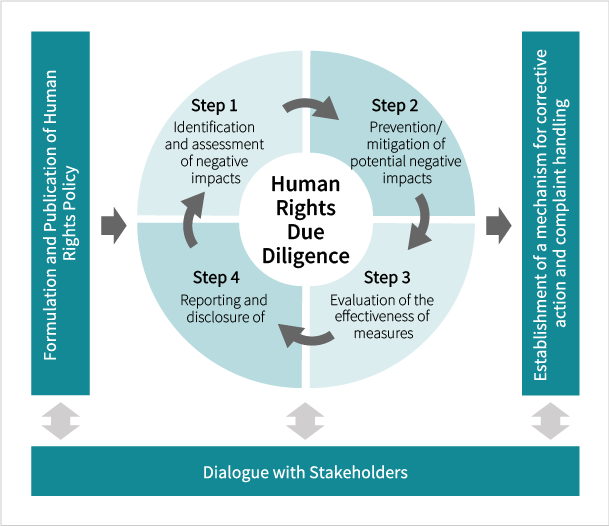 Overview of Human Rights Initiatives
Overview of Human Rights InitiativesSince human rights issues are wide-ranging, each department is depending on the issue. The progress of work and problems are checked by each department and each relevant specialized committee.
In addition, in response to the recent global trend toward legislation on business and human rights, discussions on human rights have begun in FY2022 in the divisions involved in the implementation of human rights due diligence (Business Management Dept., Sustainability Strategy Dept., Human Resources Strategy Dept., Environment & Safety Management Dept., and Procurement Dept.) and are continuing.
All initiatives for respect for human rights are supervised by the Human Rights Subcommittee of the CSR and Sustainability Committee (chaired by an outside director), an advisory body to the Board of Directors.
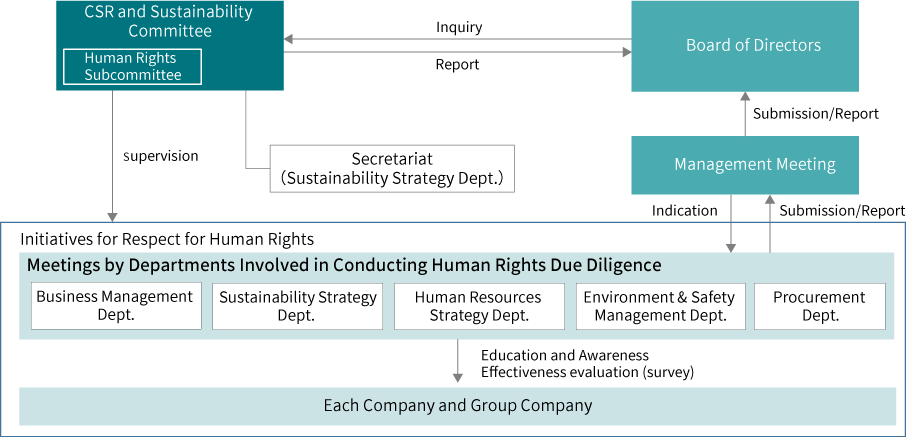 Human Rights Promotion System
Human Rights Promotion SystemWe established the Human Rights Policy in 2020 as part of the CSR Basic Policy. Subsequently, we revised the Human Rights Policy in January 2023 in response to the increasing importance of and expectations for corporate human rights initiatives and the increasing need for companies to promote human rights not only within our Group but throughout the entire value chain.
In making revisions, the Human Rights Working Group, with the advice of external experts in the field of human rights, prepared a draft revision, taking into consideration our Group’s issues, human rights risks, global standards, etc. The draft was then reviewed by the CSR and Sustainability Committee and approved by the Board of Directors.

We are working to identify, assess, prevent and mitigate human rights risks related to the business operations of our Group.
In identifying human rights risks, we organized the Group’s major value chains and related stakeholders and extracted commonly assumed human rights risks for each value chain. We then organized the Group’s human rights risks by referring to reports from international organizations, media databases, and other surveys, as well as benchmarks from other companies. We then conducted a simplified human rights impact assessment and mapped them and identified priority human rights risks.
| Our Group | Supply Chain |
|---|---|
|
|
Based on these results, we are now promoting human rights due diligence initiatives depends on risk assessments, primarily within our group and supply chain.
We also recognize that the human rights risks we have identified may change depending on social conditions, the progress of our group's business, the development of new business relations, etc.
In order to increase the effectiveness of our efforts, we will conduct periodic reviews of the risk mapping.
We conduct compliance awareness surveys of employees and human rights and labor surveys of Group companies to identify human rights violations and potential human rights risks.
To promote CSR and sustainability efforts throughout our supply chain, we issued the CSR and Sustainability Procurement Guidelines, which have been deployed to suppliers. The guidelines include compliance matters related to human rights, including labor, safety, and health.
To monitor the status of implementation by suppliers, we conduct surveys every two years using a checklist and provide feedback on the results. For suppliers that require follow-up activities, we visit them to check the situation. We also provide support as appropriate when improvements are needed.
In FY2023, we revised the guidelines and checklist and conducted a supplier survey using the new checklist.
| Our Group | Compliance Awareness Survey |
|
|---|---|---|
| Human Rights and Labor Survey |
|
|
| Supply Chain | Survey using the CSR and Sustainable Procurement Guidelines check sheet |
|
We have contact points in place to accept opinions, questions, requests, etc. from stakeholders, including customers, suppliers, and employees.
Reports and consultation requests related to human rights from suppliers and employees are accepted by contact points for the whistle-blowing system.
For consultations and reports we receive, we investigate the facts with utmost care to ensure that the person who reports or consults is not identified or does not feel uneasy, and if any problem is identified, we deal with it promptly. In addition, we prohibit disadvantageous treatment of persons for reasons of having reported or consulted. We also confirm with the persons whether they are treated disadvantageously.
We hold regular labor-management meetings with the labor union, which represents employees, to discuss working hour management and work styles. In FY2023, we also held a dialogue on the theme of human rights.
For our suppliers, we receive consultations through the consultation desks, etc., and we sincerely listen to their problems and concerns and discuss with them to help them solve problems and improve the situation while deepening mutual understanding.
In addition, we hold roundtable meetings with representatives of residents living near our plants to exchange opinions on various matters, including whether there are any issues that could threaten their living environment.
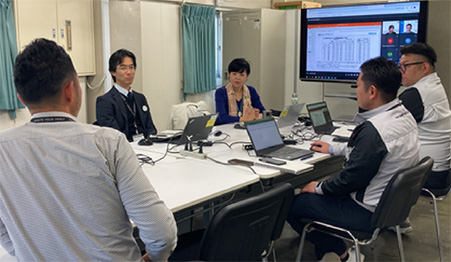 Dialogue with the labor unions
Dialogue with the labor unionsWe distribute the Compliance Guidebook to employees at our group.
The Compliance Guidebook is a booklet that compiles corporate and social rules. It is used to check correct action to be taken as a member of the Niterra Group when it is difficult to make judgments. This guidebook also stipulates compliance matters related to human rights, including respect for human rights and prohibition of various types of harassment (e.g., harassment related to pregnancy, childbirth, childcare leave and long-term care leave, bullying, and mobbing, as well as sexual harassment, including that directed against people of the same gender and in relation to sexual orientation or identity). The guidebook is also used in daily awareness-raising activities, such as read-through at the workplace.
In human rights training for all employees, employees watch a video on the necessity of respect for human rights, the Group’s human rights policy, human rights due diligence and remedies, and they take a check test to confirm their level of understanding. In addition, we also hold human rights seminars for management to provide them with the opportunity to consider global trends, business and human rights, etc. We are working to raise awareness of human rights among management and employees through increased education and information provision.
We have been recently increasing opportunities to raise awareness about gender equality and LGBTQ+-related issues through our human-rights-related training and e-mail newsletters. We are also monitoring human rights problems around the world.
In July 2021, we publicized “My Declaration of Human Rights” to show support for the “My Declaration of Human Rights” project promoted by the Ministry of Justice.
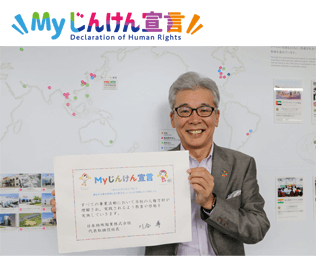 President Kawai holding a declaration card
President Kawai holding a declaration card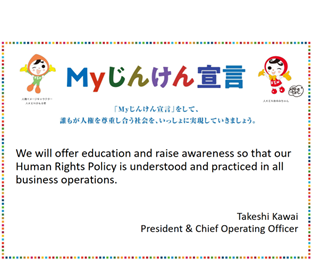 “My Declaration of Human Rights”
“My Declaration of Human Rights”